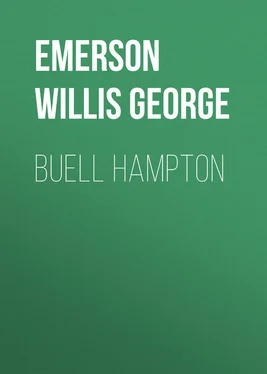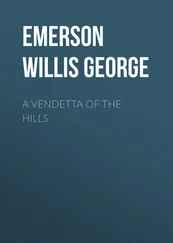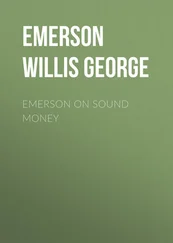Willis Emerson - Buell Hampton
Здесь есть возможность читать онлайн «Willis Emerson - Buell Hampton» — ознакомительный отрывок электронной книги совершенно бесплатно, а после прочтения отрывка купить полную версию. В некоторых случаях можно слушать аудио, скачать через торрент в формате fb2 и присутствует краткое содержание. Жанр: foreign_antique, foreign_prose, на английском языке. Описание произведения, (предисловие) а так же отзывы посетителей доступны на портале библиотеки ЛибКат.
- Название:Buell Hampton
- Автор:
- Жанр:
- Год:неизвестен
- ISBN:нет данных
- Рейтинг книги:5 / 5. Голосов: 1
-
Избранное:Добавить в избранное
- Отзывы:
-
Ваша оценка:
- 100
- 1
- 2
- 3
- 4
- 5
Buell Hampton: краткое содержание, описание и аннотация
Предлагаем к чтению аннотацию, описание, краткое содержание или предисловие (зависит от того, что написал сам автор книги «Buell Hampton»). Если вы не нашли необходимую информацию о книге — напишите в комментариях, мы постараемся отыскать её.
Buell Hampton — читать онлайн ознакомительный отрывок
Ниже представлен текст книги, разбитый по страницам. Система сохранения места последней прочитанной страницы, позволяет с удобством читать онлайн бесплатно книгу «Buell Hampton», без необходимости каждый раз заново искать на чём Вы остановились. Поставьте закладку, и сможете в любой момент перейти на страницу, на которой закончили чтение.
Интервал:
Закладка:
“Oh, Captain,” cried his wife, with an exasperated expression of countenance, “won’t you – can’t you divorce, for one short evening, the coarseness of business from the refinements of social intercourse? It seems impossible for the captain to rise above his bank counter,” said she, apologetically, to Hugh.
“Not a bad level to maintain,” replied the husband, “and a good many people would feel quite content if they were on a level with the Meade National Bank counter.”
“I do not say anything against your business, Captain, but please do not try to step outside the beaten path with which you are familiar. It is unbecoming in you, and makes you appear quite ridiculous, I assure you.” The captain winced, in silence.
Shortly after they had arisen from the table, Mrs. Osborn went driving, and the captain and Hugh sat on the broad veranda and smoked their cigars, while the veteran told reminiscences of the war. The infinite tenderness with which the captain held his boy was touching to Hugh. The little fellow nestled contentedly on his father’s knee, where he soon fell asleep. When the captain finally arose to carry him within, the child murmured in his dreams, “Papa an’ I is lovers – is lovers.”
“Did you hear that?” exclaimed the old captain to Hugh, and a tear fell from the bronzed face of the father, and rested like a benediction on the soft cheek of the sleeping boy.
CHAPTER VI. – MAJOR BUELL HAMPTON
MAJ. BUELL HAMPTON, editor and proprietor of the Patriot , called at the bank one morning and was introduced to Hugh by Captain Osborn.
“I am indeed delighted,” said the major, as he extended his hand, “to meet any one who is Captain Osborn’s friend. The captain and I were both for humanity during the late unpleasantness, acting our parts, however, in different ways; and now we are neighbors and friends, both believing in the same government and respecting the same flag, although I must say we offer up our devotions at different political shrines.”
The major laughed good-naturedly, when Captain Osborn said, “Yes, we believe in the same government, but we have different professions of faith.”
The major was an exceptional specimen of manhood. He was six feet two inches tall, straight as an Indian, splendidly proportioned, and weighed, perhaps, two hundred and forty pounds. His broad-brimmed slouch hat was suggestive at once of the South.
On the silk lapel of his Prince Albert coat was a dainty carnation boutonnihre . This little flower was in keeping with the tenderness of the man’s heart. A heavy gold chain, with many a link, encircled his neck as a watch-guard. To those who knew him best, this chain was symbolic of his endless donations to the poor. Like the chain, his charities seemed linked together – without a beginning, without an end. His carefully polished shoes and neatly arranged necktie denoted refinement and good taste. These outward evidences of genteel breeding were not offensive to the poor, but, rather, inspired them with confidence and courage to accept alms from this man. His long, dark hair and flowing mustache were streaked with gray, his nose was large, his forehead knotted, and the wrinkled lines of his face were noticeable, – strong, deep-cut. There was a thoughtfulness, a gentleness, a kindness beaming from his gray eyes and from every lineament of his rugged face, and, indeed, from every motion of his powerful frame, that forced a conviction into the heart that here was one upon whom God had set his seal of greatness – of goodness.
There were times, however, when in deep meditation, that his eyes seemed resting afar off on some unraveled future. An observer might fancy that a cloud had obscured the radiance of his soul, leaving in its stead only dissolving shadows of sadness. Then the lines of his face would deepen and his soul would seem far away on some errand of mercy. It was in such moods that he became patriarchal in appearance, and the observer might well have exclaimed, “Here is one over whom an hundred winters have blown their fierce north winds,” but, when he turned again, with his inspiring smile of benevolence, to answer perhaps the simplest question of the simplest questioner, few would have judged him to have seen more than half a century. At such times the soul-light seemed illuminating his classic yet gentle race with kindly interest for the little things of earth, and his years would then have been reckoned by summers and south winds – not by hoary winters.
“By the way,” said the major, turning to Hugh, “what is your political belief?”
“I am a Republican,” replied Hugh, “but I trust, though differing politically, that our social relations may be most pleasant.”
“Thank you,” replied the major, with urbane courtliness, “I share your wishes, but I may as well tell you now, as later, that the Republican party is bound to be snowed under, root and branch, in our local election this fall.”
“That remains to be seen,” interposed Captain Osborn, smiling. “The game of politics is never out until the returns are all in.”
“That’s all true, Captain,” replied the major, “but if your Republican soul does not languish in utter despair when the returns are all in, then I shall have labored in vain. The Patriot goes to every nook and corner of the county, and I fancy it is like ‘bread cast upon the waters,’ or ‘sowing seeds of wisdom’ – results of a satisfactory nature are sure to follow.”
“I presume,” said Hugh, “that Captain Osborn is a Republican because he believes that the better class of Northerners adhere to that party, and on the other hand, Major, you are a Democrat because no respectable Southerner could live in the South and not be a Democrat.”
“That’s well put, young man,” said the major, looking kindly at Hugh, “the only fallacy in your deduction is that I am not a Democrat, although I voted that ticket for many years in Kentucky. Politically, I am supposed to be a Populist; in truth I am a Reformist. However, Mr. Stanton, I will not intrude my political faith upon you at our first meeting. I am sincerely delighted to have met you; and in some way I have an impression that we shall become great frends. Do you love music?”
“Passionately fond of it,” replied Hugh, “but, unfortunately, I cannot play even a Jew’s-harp.”
“A soul without a language,” said the major, as he looked benignly at Hugh. “Internal rhythm and melody that move us with their invisible touch, and then die away like a song on the night wind – into silence – when one is unable to express the emotions that stir the inmost soul. Yes, I believe I understand you.”
Hugh looked at the major in amazed surprise. “Yes,” said he, “I believe you do. I believe you understand my feelings even better than I do myself.”
“Now I am sure we are to be friends,” said the major, laughing. “Come and see me often. The latch-string hangs on the outside of my house, while my den at the Patriot office has an easy chair awaiting you at all times.”
When Major Hampton had taken his departure Captain Osborn observed, “Well, Hugh, did I not tell you that he was a cultured gentleman? How do you like him?”
“Why, Captain,” replied Hugh, “he is a revelation to me. I am drawn to him as steel to a magnet. What a physique! What a noble, face, so full of rare intelligence, sympathy, and tenderness! Really, Captain, the major is one of the most perfect specimens of physical and intellectual manhood that it has ever been my pleasure to meet.”
“Very true,” replied Captain Osborn. “Yet, in one way, he is quite an enigma. Formerly a Kentucky Democrat – now a Populist of the most ultra type, an organizer of the Farmers’ Alliance, and the founder of a secret society among them known as the ‘Barley Hullers.’ It seems incongruous to me that he should entertain and champion such political heresies.”
Читать дальшеИнтервал:
Закладка:
Похожие книги на «Buell Hampton»
Представляем Вашему вниманию похожие книги на «Buell Hampton» списком для выбора. Мы отобрали схожую по названию и смыслу литературу в надежде предоставить читателям больше вариантов отыскать новые, интересные, ещё непрочитанные произведения.
Обсуждение, отзывы о книге «Buell Hampton» и просто собственные мнения читателей. Оставьте ваши комментарии, напишите, что Вы думаете о произведении, его смысле или главных героях. Укажите что конкретно понравилось, а что нет, и почему Вы так считаете.












